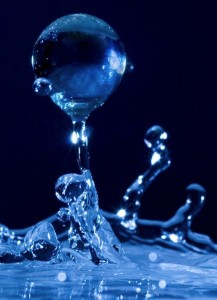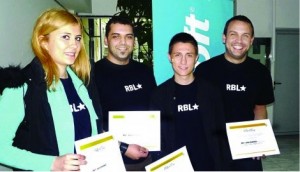Microsoft Recognises Serb Students For Making Water From Air
 Four Serbian students have been recognised for developing what is being hailed as a practical solution to help tackle the global water crisis. Big issues demand bold claims, and this team from Novi Sad is unafraid of the grand scale of the problem that they wish to address. With water conservation an issue that will increasingly impact the world, the need is great for the creative application of some pretty radical solutions. This is an age that calls for big thinkers and practical solutions.
Four Serbian students have been recognised for developing what is being hailed as a practical solution to help tackle the global water crisis. Big issues demand bold claims, and this team from Novi Sad is unafraid of the grand scale of the problem that they wish to address. With water conservation an issue that will increasingly impact the world, the need is great for the creative application of some pretty radical solutions. This is an age that calls for big thinkers and practical solutions.
Now one of the world’s richest businesses has seen exactly this kind of creative thinking with real-world application in the work of Novi Sad’s Rebel Star Team. This group of enthusiastic students from the University of Novi Sad is already receiving commercial interest in its Wabox Project, which was born from a wish to picture a world where technology can help solve the world’s water crisis.
Microsoft Imagine Cup
Inspired by the Microsoft Imagine Cup theme “Imagine a World Where Technology Helps Solve the Toughest Problems” team of Computer Science students from Faculty of technical science (University of Novi Sad).
These four computer science students – Ivana Kovačević, Goran Đonović, Milan Savić and Srđan Radulović – have been working to develop a workable way to produce water from air. The result is Wabox, a practical solution that has placed them among the top three software design solutions in the Serbian heat of the Microsoft Imagine Cup. The other two teams from Serbia to be recognised were CatchCake from Subotica, and Team ICU for their project, AdHoc. Winners CatchCake, a team that presented a smartphone alternative to the common white stick for the blind, will now go forward to the finals in Australia.
This annual international contest, was set up by Microsoft to encourage students to present technological solutions to address some of the world’s toughest challenges. By drawing attention to the United Nations’ eight Millennium Development Goals, the contest hopes to encourage students to see these ambitious challenges as a guide to promote change in their local community or around the world.
Water From Air in Serbia
The concept of making water from air is not a new one and industry has been using commercial atmospheric water generators (AWGs) for some time. Until now, though, there has not been significant movement in developing similar new technologies that can be used by communities to aid the lives of people towns and villages across the most affected regions.
“The main problem with similar solutions is that they are expensive and not very efficient,’ Goran Djonović told Wild Rooster. “If we want to help solve the water crisis we need to find a sustainable solution, and we have done that.
“Our solution uses the earth’s temperature to cool down moist air. In order to achieve the dew point, dependent on the input air temperature, we need to provide additional cooling, which we get using solar panels. In this way we have a cheap and clean solution with zero effect on the environment. The condensed water is made drinkable by passing through a five-layer filter to be disinfected and mineralized.”
Ivana Kovačević added: “There are 884 million people who lack access to safe water supplies and every 20 seconds a child dies from a water-related disease. This is by far the biggest problem of mankind today, and it will be more serious in the years to come. With our solution we believe that we could stop this. Making drinkable water would save lives, but also it could improve hygiene and benefit agriculture. And not just in desert-like areas, but also on islands and in polluted cities.”
Fellow student Milan Savić said: “Besides a combination of humidity gathering techniques, our solution makes use of unique software. In order to make the generator as efficient as possible you have to monitor system parameters and adjust them to maintain the dew point. Without this software the solution is less effective and, in some cases, useless. We developed a set of algorithms that makes our solution efficient in any environment.
“We were also thinking about what happens after we get the water and how to predict production, so we developed an algorithm that predicts the amount of water to be produced, based on records and the weather forecast. To make that more efficient we developed a cloud based application, which enables the system to be monitored and controlled via the internet.”
Serbian Business Supports Wabox Project
Dejan Lacmanović of the University of Zrenjanin mentored the students in their efforts. They also received support from the Mihajlo Pupin Faculty at the University of Novi Sad, from Execom, a local business with strong international connections, and from Algotech, who provided free sms support.
 This should be just the start for the Wabox Project. Buoyed by its success at the contest and the attention that has already been attracted from possible investors and business partners, the team hopes to develop its idea further and take Wabox beyond the prototype stage.
This should be just the start for the Wabox Project. Buoyed by its success at the contest and the attention that has already been attracted from possible investors and business partners, the team hopes to develop its idea further and take Wabox beyond the prototype stage.
Srđan Radulović said “We didn’t really think about profit while we were developing our solution. We were driven by an intent to find a practical solution to a global problem. But if you look at the facts, the UN, Rotary International, The Bill & Melinda Gates Foundation and other humanitarians spend more than $3 billion each year on providing needy people with drinkable water. That makes you will realise that ours is a very cheap solution.
“With our $150 prototype we were able to successfully demonstrate our general idea and show the possibilities our software. But in order to build a usable model of the hardware we will need bigger investment.”
Srđan is justifiably ambitious in his intentions and has some hefty challenges in his sights. “At this very moment, one billion people don’t have access to clean water, and over three billion do not have sanitation,’ he said. “But water is all around us. Using atmospheric water generators, controlled by our cloud based Wabox software solution, we could make enough drinkable water for everybody. But not only that: We could make water for agriculture and sanitation and contribute to a clean environment.
“It might sound ambitious but we know that Wabox could help save lives and improve the well-being of so many people. Women in Africa would no longer be forced to travel up to 10 kilometers every day to get fresh water. Water is the source of all life, and the lack of it is going to be the number one problem for all mankind if we do not come up with a solution very soon. A cheap, effective, sustainable and easy to use solution already exists: Its name is Wabox.”



8 / 31 / 2012 1:19 am
Water will indeed be the oil of the 21st Century. Access to water will be made all the more ceghllnaing given shifting weather patterns due to global warming. Think about this: most water infrastructure has been built based on weather patterns that have been in place for very long periods of time. What is going to happen when those patterns change due to global warming? There will be many opportunities for companies to save and make money in the area of microsustainability of water.
11 / 8 / 2012 10:32 am
Indeed water is more precious than oil. Certainly, global warming is going to effect mother nature. We need to go more for green, stop cutting forest, grow more forests.